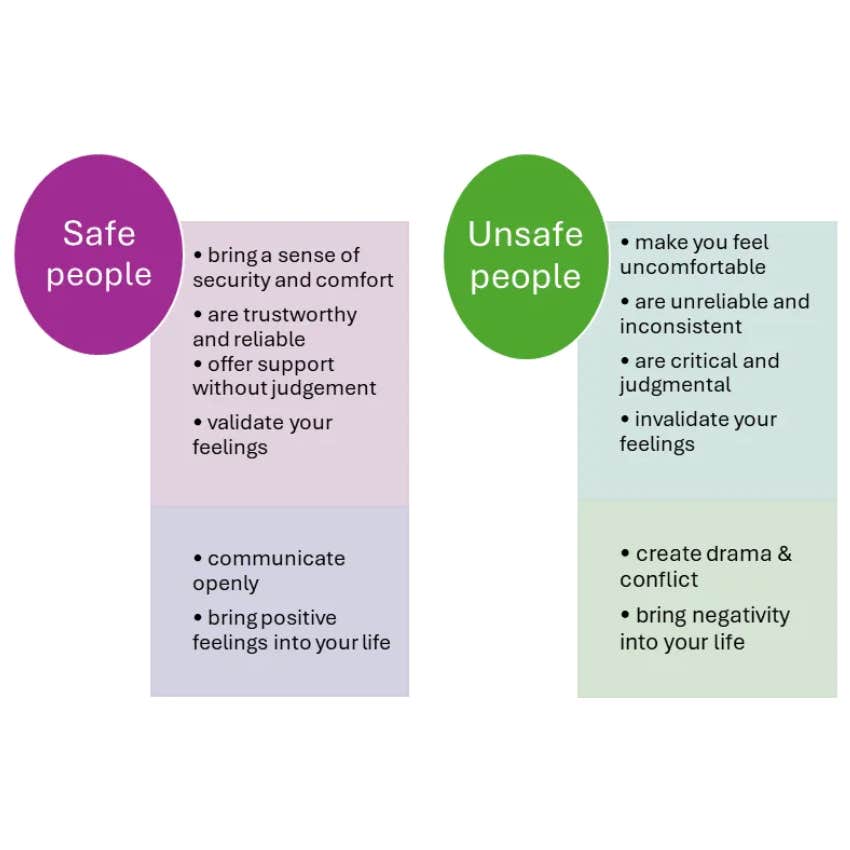5 'Scarlet Flags' Even Couples In The Healthiest Relationships Overlook
Maybe you should pay more attention to these alarm bells.
 stagestock, technotr, perinjo | Canva
stagestock, technotr, perinjo | Canva There’s a song by Hozier, called “Unknown/ Nth,” that at some point goes,
“If there were scarlet flags, they washed down in the mind of me
Where a blinding light shone on you every night.”
It’s true, isn’t it? When you’re in love, you let a lot of things slide. (Also, you should listen to the whole song.) As the lyrics suggest, red flags fade into the background when love blinds you. You overlook actions that should ring alarm bells. You find yourself making excuses and rationalizing behavior that you know deep down should be unacceptable.
Unfortunately, the more you let bad behavior in your relationship slide, the more your partner will take advantage of you. You’re allowing them to push boundaries and disrespect your needs because they know they can get away with it.
I may not know you, but if you’re in a relationship, I can bet there have been moments where you’ve brushed aside your concerns or ignored behavior that didn’t sit right with you. And it might not be a big thing if your partner leaves their dirty socks lying around (but honestly, gross) or turns the bathroom into a disaster zone.
Here are 5 'scarlet flags' even couples in the healthiest relationships overlook:
1. Emotional unsafety
Why it’s a scarlet flag: when someone consistently makes you feel like you’re walking on eggshells, it’s a bad golden trio: a lack of trust, respect, and genuine connection.
Do you know how some people you meet quickly make you feel comfortable and safe? You feel like you’ve known them for years, even though you’ve been talking for weeks. It doesn’t take you long to let your guard down and open up to them, and they don’t even have to try for it. With them, there’s no need for pretense or reservation.
But there are also people that, in their presence, you can neither relax nor be open about your feelings. It’s like there’s an invisible barrier dividing you, and no matter how much time passes, your interactions remain surface-level. There’s a simple explanation for that: it all comes down to how emotionally safe a person makes you feel.
If you want a definition of emotional safety, I like how psychologist Helene Brenner and couples therapist Larry Letich explain it in one of their articles:
“But contrary to what some might think, emotional safety doesn’t mean bubble-wrapping yourself or others so that nobody ever feels hurt or uncomfortable. Emotional safety is something very different and fundamentally rather simple. It’s the visceral feeling — that is, a feeling that you feel physically, in your body — that with this person or these people or in this place, you don’t have to feel scared to be you.”
Now, let me stop you right there because I know what you’re thinking: abuse = lack of emotional safety. But it’s not always that extreme. A person doesn’t have to be abusive to make you feel tense and emotionally unsafe. For example, maybe they’re critical or judgmental or constantly invalidate your feelings and experiences. It could be subtle things, too, like making snide remarks or giving you backhanded compliments that chip away at your self-esteem.
Even if they’re not intentionally trying to hurt you, their words and actions still impact your feelings about yourself and the relationship. They still make it challenging to be your authentic self around them. They still bring negative feelings into your life.
To give you a basic idea of how a safe vs unsafe person makes you feel:
 Created by author | Medium
Created by author | Medium
2. Disregard
Why it’s a scarlet flag: it communicates a lack of empathy, understanding, and emotional investment in the relationship.
Have you ever felt like your partner didn’t try to understand your perspective or empathize with your experiences? Maybe they disregarded your opinions or decisions or didn’t take your concerns and insecurities seriously.
That’s emotional invalidation at play. This behavior creates a toxic dynamic where your thoughts and feelings are constantly dismissed. It makes a sense of distance and disconnect between you and your partner, and let me tell you, that’s no fun. Sooner or later, you’ll start feeling invisible and unimportant.
You can spot hints of disregard towards your feelings in your relationship when you’re (consistently) being told things like:
- “I don’t understand how you can think like that.”
- “You’re blowing things out of proportion.”
- “You’re the only one who thinks that.”
- “That’s not a valid concern.”
- “You shouldn’t feel that way.”
- “I don’t have time for your drama.”
- “You’re being irrational.”
Ultimately, disregard is toxic because it undermines what makes a relationship satisfying and fulfilling — being seen, heard, and valued by the person you care about. You shouldn’t brush this behavior off by telling yourself, "Oh, they just disagree with me,” or “They’re simply honest.” No. You can’t excuse your partner for shutting you down and dismissing your thoughts and feelings. They should be able to be open and accepting of your point of view — even if they disagree with it.
3. Martyrdom
Why it’s a scarlet flag: you become a babysitter for your partner; their needs will always be more important than yours.
Some people are in love with suffering. They like being seen as victims and need constant validation for the “sacrifices” they make. Trust me, you don’t want to be in a relationship with these people. When this mentality infiltrates a romantic relationship, you get a self-centered partner who consistently seeks attention and sympathy for their struggles (most of which are just in their head). Before you know it, you’ll find yourself constantly babysitting them and feeling your needs and feelings are secondary.
The cocktail of martyrdom also comes with:
- chronic negativity
- refusal to accept help
- lack of accountability for their actions
- attention seeking
- self-sabotage
- guilt trips
The worst thing about being in a relationship with someone who likes martyrdom is feeling unheard and unseen. Whenever you want to talk about something that concerns you, like a bad day at work or a fight with a friend, they pay little to zero attention and somehow manage to turn the conversation to them. Trust me, you deserve better than being a supporting character in the drama of someone else’s life.
4. Power play
Why it’s a scarlet flag: power play shows an imbalance of power and control within the relationship, where your partner seeks to assert dominance or control over you.
Some power games are relatively innocent and socially acceptable. If we’re being honest, most of us have played some kind of power game when we first met someone. You know, playing hard to get, waiting some time before texting or calling back, acting disinterested or aloof — all to influence and measure the other person’s interest.
However, ongoing mind games during a relationship are a scarlet flag you shouldn’t ignore. In healthy relationships, the people involved should have equal or (very) close-to-equal power and influence on one another. The presence of power games signals a fundamental flaw in the relationship dynamic.
Some examples of power play in relationships are:
- emotional threats (“If you do this again, I won’t talk to you for days/I’ll break up with you”)
- dictating the terms or frequency of sexual intimacy (“If you truly cared about me, you would always be available for sex/If you don’t want to have sex, it means you don’t love me”)
- blame-shifting (“It’s your fault I cheated on you”/“You’re the one who made me angry”)
- conditional love or approval (“I’ll only help you if you do what I say”)
- playing the victim (“I’m not good enough for you”/“You’re making me feel like the bad guy here”)
These power games create an environment of fear, insecurity, and emotional turmoil, where your person’s needs and desires consistently take precedence over yours. However, relationships are all about giving and taking and mutual compromise. You can’t have one person calling all the shots. The worst thing? If left unchecked, these games can escalate into something far worse, potentially leading to emotional abuse or even physical harm.
5. Cynicism
Why it’s a scarlet flag: it reflects a deep-seated lack of trust, optimism, or belief in the potential for genuine connection.
Cynicism is terrible for a relationship because it brings negativity and mistrust. (Also, everyone needs a little bit of romance in their relationship, and if you say you don’t, you’re a liar.) Cynics have very little faith in their partner. They see no purpose for genuine love and connection. They’re convinced everyone is the same and everyone will hurt them.
Years ago, I dated a cynic for a short time, and I can tell you some of the thoughts of a person who views relationships and romance through a lens of pessimism:
- “Love doesn’t last.”
- “People only take advantage of you.”
- “Everyone is superficial these days.”
- “Cheating is just a matter of time.”
- “People only care about themselves.”
- “Opening up to someone only gets you hurt.”
Let me ask you something. How can you build trust and connection with someone who always sees the glass as half empty and constantly expects the worst from you? You can’t because cynicism is the absence of trust. And trust is the foundation for any strong relationship.
And let’s not forget the impact it can have on your self-esteem. Constantly being met with skepticism can make you question your worth, whether you’re doing something wrong, and if it’s your fault that you don’t receive love and respect.
This list of scarlet flags isn’t exhaustive; undoubtedly, there are others. Trusting your instincts is critical, and if you notice signs that ring alarm bells in your partner’s behavior, it might be time to consider walking away. You might also want to try to salvage your relationship (because when you’re in love, that’s the only thing you think about), but if your partner shows no sign of self-improvement, you know what to do.
Margaret Pan is a freelance writer on a journey to unravel the complexities of human experience through the written word.
